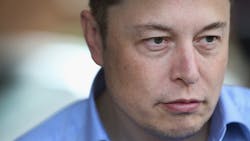Among the many disconcerting things about Tesla's offer to buy SolarCity was this line from Elon Musk during the June 22 conference call explaining the deal:
Since SolarCity is constrained in the short term from just going out and raising equity itself, Tesla would provide a bridge loan, if needed. I actually don't think it's going to be needed, to be clear ...
This was disconcerting because, to summarize, a company burning a lot of cash was talking about buying another company burning a lot of cash and throwing out the idea of maybe lending that target company some cash to tide it over.
So far, Tesla hasn't provided that bridge loan. But on Tuesday evening, SolarCity did reveal that it needs the money and that Musk is providing it himself.
Musk, along with Lyndon and Peter Rive -- SolarCity's CEO and technology chief, respectively -- are buying $100 million of a $124 million offering of "Solar Bonds."
An observation: When insiders buy 81% of some paper a company is selling, it is unlikely said paper is proving very attractive to regular investors. Another observation: This is especially telling when said paper carries a coupon of 6.5% and matures in only 18 months. Two-year Treasuries, in comparison, yield about 0.75%.
Despite the name, Solar Bonds aren't tied to cash flows from specific solar projects -- those are solar asset-backed securities. They're just a type of unsecured debt SolarCity started selling directly to the public in late 2014. Assuming it sells all of the $124 million currently on offer, SolarCity will issue at least $300 million this year -- more than all it had sold up to the end of 2015.
Yet what began as a way of tapping a wider pool of retail investors has morphed into something like a revolving credit facility from insiders -- and at an ever higher cost.
When SolarCity began selling the bonds, they were low-cost and had relatively long maturities -- exactly as you'd expect when the buyers are moms and pops eager to finance the energy revolution. For example, only a year ago, SolarCity was offering solar bonds that paid 5.45% a year maturing in 15 years.
Let that sink in: The latest bonds pay an extra percentage point but have a maturity only one-tenth as long.
What's more, mom and pop haven't been big buyers, despite the rising coupons. I've redrawn the chart above to show who bought the Solar Bonds, and thrown in a pro-forma estimate for the second half of this year:
Those related parties are concentrated overwhelmingly in short-dated maturities, too. As of June 30, their Solar Bonds due more than one year out amounted to all of $100,000, or just 0.05% of the total.
SpaceX, Elon Musk's rocket vehicle, offers a good example of how these bonds have become more like a revolver. In March 2015, it bought $90 million of Solar Bonds paying 2%. Three months later, it bought another $75 million. When both matured a year later, it reinvested them in new 1-year bonds -- only this time, they paid 4.4%. In the first half of this year, SolarCity raised almost $177 million with Solar Bonds -- but also repaid $173 million.
It is little wonder that even related parties are demanding higher coupons. These aren't your grandfather's bonds. Holders can't initiate bankruptcy proceedings if SolarCity misses a payment, for example, or demand to be cashed out if there's a change of control (such as Tesla buying the company). In general, they also aren't transferable or listed on an exchange, so once you buy them you're pretty much in it for the duration (some Solar Bonds do allow redemption every quarter).
That SolarCity is relying on this peculiar funding is just the latest red flag for investors. There's an added twist, though.
I wrote here about how solar leasing firms estimate a net present value for the monthly cash flows coming in from customers over the next couple of decades. They generously award themselves a 6% discount rate when calculating that number -- and the cost of SolarCity's latest bond makes a mockery of it.
This matters because, at the end of June, SolarCity valued its portfolio of installed panels at $4.04 billion -- using 6%. Bump that rate to 8% and, voila, the value drops by a fifth to $3.22 billion.
Soon, of course, this will all be Tesla's problem -- or rather, it'll be a problem for Tesla's shareholders. Perhaps that's why, despite the fact that Tesla cut the price it is offering from the original range, the market appears to be getting anxious again about whether or not the deal gets voted through.
Liam Denning
This column does not necessarily reflect the opinion of Bloomberg LP and its owners.
